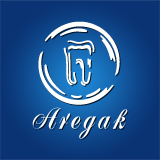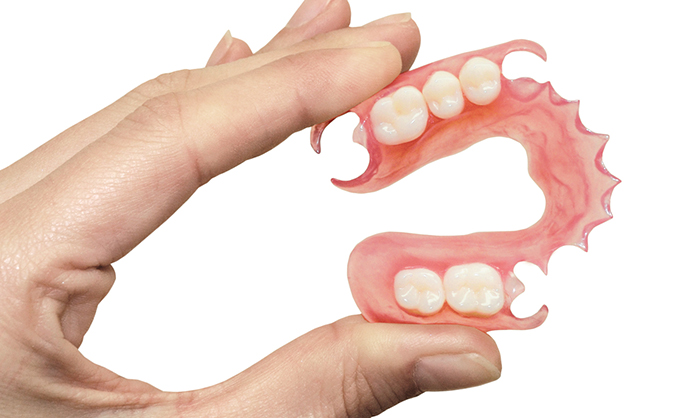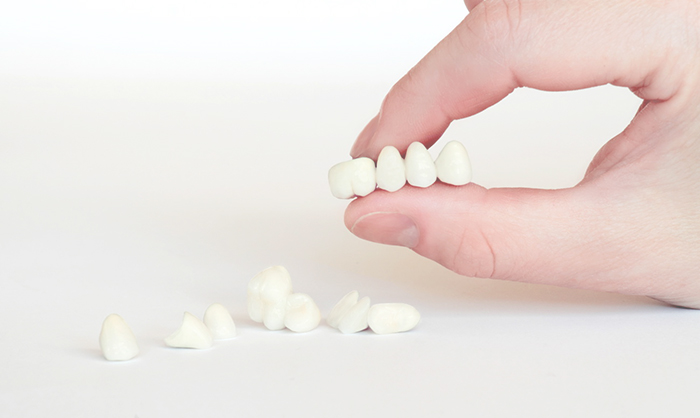
Aregak Dentistry and Implantology Center
Prosthetic Dentistry of Aregak Dentistry and Implantology Center
Dental prosthetic deals with complete rehabilitation of mastication. Dental prosthesis is carried out on individual basis taking into consideration the clinical circumstances and patient's preferences.
The Clinic conducts prosthetic dentistry in accordance with international standards. The Clinic uses only contemporary materials such as polymer, metals, zirconium, ceramic, composites, etc.; to make functional and aesthetic prostheses. The Clinic specialists have a great experience of making dental prostheses of any complexity: metal ceramic, bridgework prosthesis, metal plastic and removable constructions, such as removable and removable partial dentures, clasp prostheses, etc.
Lumineer ceramic veneers may be used where there are diastema (the distance between the teeth) and uneven teeth, enamel cracks or broken teeth, discolor of teeth, defects of old orthopedic constructions (remove defects without displacing the construction from the tooth). Lumineers are ultra – thin layers made of very strong ceramic. The thickness of these cosmetic veneers vacillates between the limits of 0.2 -0.3 mm. The demand for these cosmetic veneers is quite high despite of its high price. That is due to its best aesthetic result and long duration. For placing lumineers there is no need to hew teeth priorly and with the help of them it is possible to make the teeth to look even without using braces. Lumineers are possible to attach to any surface of tooth, such as filling, crown or even dent.

Lumineer ceramic veneers are placed during two visits.
When tooth crowns are damaged teeth can be restored with the help of inlays which give the tooth a second life. Aregak Dentistry Clinic offers several types of inlays: ceramic, composite and zirconium oxide.
Ceramic inlays are suitable to use when the 1/3 of the tooth is decayed but the tooth is still there. Ceramic inlays allow the dentist to match the color of the replacement perfectly to that of patient's tooth. It will be hard to tell the difference between the natural tooth and the replacement. Saliva and bacteria do not change the color of ceramic inlays. Those types of inlays are also resistant to the influence of external factors.
Composite inlays are similar to natural tooth structure and have excellent plastic feature and high aesthetic quality. The advantages of composite inlays are durability, high effectiveness of tooth restoration and maximum aesthetic result.
Zirconium oxide inlays are recent achievements of tooth restoration in aesthetic dentistry. Zirconimum dioxide inlays consists of metal free base and a new type of ceramic coating which matches the color of the replacement perfectly to that of patient’s own tooth enamel. It does not require tooth depulpation, which means that tooth remains.
The zirconium oxide inlays are made during two visits.
If the tooth is completely decayed but has a complete root then the application of stump inlays will help. Stump inlays are constructions which allow recovering the anatomic shape of the damaged dental crown or a tooth with caries. It is considered to be one of the best ways to fill a big dental cavity. Stump inlays are applied while installing dental crowns. In addition to this, they can be combined with dental root posts to recover the completely damaged tooth; meantime they also serve as a base for bridgework prostheses.The stump inlay is placed in the tooth root canal and on top of it the dental crown is installed enabling to distribute the load of such tooth evenly. As a result the structure of tooth is recovered; moreover it became stronger and resistant to the influence of external factors.The stump inlay is fixed with cement or special glue. In this case the development of caries becomes less likely and it does not break.
If there is a partial or complete absence of teeth, removable, removable partial or fixed dentures are made for each specific case. Modern removable dentures have aesthetic appearance, they are durable, reliable and there is no need to constantly remove them from the mouth. Veneers, inlays, dental crowns, bridgework prostheses, installation of implant are considered to be fixed dentures.

Principal components of partial removable lamellar denture are the basis (plastic or metal), artificial teeth and dental clammers. Taking into account all the peculiarities, they have different sizes for each individual clinical case. The base of denture precisely fits the relief of the surface of prosthetics area and surface of the side teeth, on which the denture is fixed with clammers. Artificial teeth attached on the base complement the missing teeth.
When there are no molar (chewing) teeth at the end of denture, the prosthesis is attached with the help of lock system and one side dental prosthesis is placed with the help of clammers and lock.
If one tooth is missing, such as the molar tooth, conventional removable dentures are used. They are made of ceramic or plastic. They are attached to the side teeth with special metal materials which firmly are fastened to the tooth that serves as a base.
If more than one tooth or molar teeth are missing, it is advisable to use removable partial dentures which can serve as a basis for temporary bridge dentures. Plastic lamellar denture and clasp denture are types of removable partial dentures.

Partial plastic dentures are simple and financially affordable constructions. They are attached to the side teeth of the necessary segment with special metal clammers which are attached to the base of the tooth tightly ‘hugging’ it and not allowing the denture to move. Gums serve as a base for this procedure. Even though plastic constructions are affordable, they have number of disadvantages, among which are the possible pain and feeling of discomfort in lower jaw. Composite and ceramic materials are considered to be the best for denture preparation.
Clasp dentures (arched) are one of the most complex and expensive constructions. It is based on the arc which connects artificial gums and teeth. They are reliable and comfortable. Clasp dentures allow an equal distribution of pressure between the teeth and gums during mastication. They are compact in appearance, comfortable and have long term life. Clasp (Bugel) denture is prepared with individual characteristics as it should be interconnected with the natural teeth of patient and match the peculiarities of his oral cavity.

Clasp dentures can be fixed by clammers and locks or telescopic method can be applied.Clasp dentures fixed with clammers are prepared in accordance with tooth, that is why they are fixed firmly without damaging enamel.Clasp dentures fixed with lock are more durable. They are attached to the basic tooth or dental crown prepared for that tooth. In this case, being hidden inside the clasp prosthesis, externally they are not visible.
Before installing bridgework prostheses, if necessary, X - ray examination is carried out to prevent possible complications. Teeth are hewed at first than dental crowns of bridge prosthesis are placed on them. Hygiene measures, gum treatment, basic tooth filling, placement of dental crown (if necessary) are carried out in advance. Afterwards the uneven segments are hewed to make the denture placement smoother. In the next stage the ready denture is tested and all necessary adjustments are carried out and then it is fixed with cement or other materials.If within few days prosthesis related problems occur, contact your doctor.
If teeth are damaged, weak, have serious defects or simply missing, than the best method of tooth restoration is the placement of dental crowns. It is distinguished by high efficiency, long duration and durability. All these provide high protection for the tooth. Dental crown is a fixed denture which is fabricated in dental laboratory with the help of dental casting technique and then it is fixed in the mouth.
In orthopedic dentistry various types of dental crowns are applied. Dental crowns are affordable as the types of crowns are differentiated by their preparation materials. There can be metal, metal ceramic and ceramic dental crowns. When choosing a dental crown of any type the preference of patient, clinical circumstances of the specific case and the solvency of patient is taken into consideration.
Metal dental crowns are made of alloys of various metals, such as titanium, steel, gold or platinum are also applied. Metal dental crowns completely restore the tooth masticatory function, but does not look aesthetic.

Metal ceramic dental crowns are seen as one of the best options, as they combine durability and aesthetic appearance. Such crowns consist of metals which are externally covered by ceramic. Metal ensures durability for the crown whereas ceramic provides a beautiful appearance. Metal ceramic crowns restore the front and back teeth which can hardly be distinguished from natural teeth. In addition to this metal ceramic crowns are more durable than the metal alloy. They are resistant and serve for a long time.
Ceramic dental crowns are made of special dental porcelain. Such denture does not have high durability. Ceramic crowns are suitable only for front teeth to improve aesthetic appearance. They cannot resist the pressure of grinding. Ceramic dental crowns retain their color for a very long time and do not fade or turn the color to yellow.
Zirconium dental crowns
Choosing a dental clinic and dentist, it is important to understand that a high quality product cannot be cheap, and cannot be prepared within one day. Orthopedic construction which is incorrectly prepared and installed can cause various complications, such as periodontitis, malocclusion, etc. If after dental crown installation you have a tooth pain or a feeling of discomfort than you need to immediately contact your doctor.
Med-ArmTours team offers medical, preventive and cosmetology services with the same prices as in clinics, including the following additional services:
1. Online connection
2. Consulting
3. Making an appointment to see a doctor
4. Meeting with а specialist in the clinic
5. Providing a guide during the medical services, if necessary
6. Healthcare documentation to present to the patient’s insurance company.
Additional chargeable services:
1. Translator
PRICE
One-piece unit: 25,000 AMD
Metal-ceramic crown, 1 Unit Ceramko 3: 55,000 AMD
Metal-ceramic crown, 1 Unit Duceram Plus: 70,000 AMD
Metal-ceramic crown, 1 Unit IVOCLAR: 65,000 AMD
Ceramic Veneer: 85,000 AMD
Zirconium crown: 125,000 AMD
Simple clasp prostheses (with clammers): 200,000 AMD
Complex clasp prostheses: 300,000 AMD
Complete simple removable prostheses: 100,000 AMD
Complete removable prostheses Ivocap: 200,000 AMD
Removable partial prostheses VALPAST: 150,000 AMD
Preparation of a diagnostic model: 10,000 AMD
Adjustment of removable dentures: 10,000 AMD
Molded crown: 7,000 AMD
Removable denture restoration: 7,000 AMD
Aregak Dentistry and Implantology Center: basic service
Aregak Dentistry and Implantology Center: Doctors
Contact us
38/18, St. Pushkin, Yerevan, 0010, Republic of Armenia Оperators:Armenian: +374 10 53 19 93
Russian: +374 77 53 19 93
English: +374 99 53 19 93
Arabic: +374 41 53 19 93
Persian: +374 91 53 19 93 info@med-armtours.com go to map
